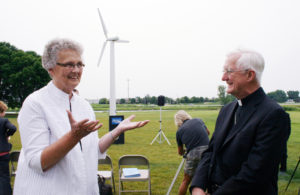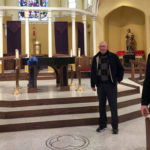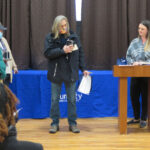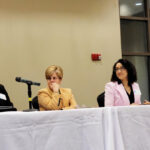By Barb Arland-Fye
The Catholic Messenger
ANKENY —Pope Francis’ call for care of creation provided the hook for a July 2 news conference in Iowa to focus attention of presidential candidates and the nation on the issue of climate change.

Sister Jude Fitzpatrick, CHM, talks with Bishop Martin Amos of the Diocese of Davenport prior to a July 2 news conference in Ankeny, Iowa, focused on Pope Francis’ new encyclical Laudato Si on care of creation. Sr. Fitzpatrick is chancellor of the Des Moines Diocese. The event took place at Des Moines Area Community College.
With presidential candidates visiting Iowa frequently in preparation for next winter’s first-in the nation caucus, organizers figured a news conference highlighting the pope’s encyclical on the environment, Laudato Si, was an effective way to spread the message.
Iowa Bishops Richard Pates of Des Moines and Martin Amos of Davenport, interfaith leaders, clean energy advocates and others participated in the event outside the Ankeny Campus of Des Moines Area Community College. A towering wind turbine, its blades spinning, served as the backdrop.
The speakers called on the faithful to help make climate change a campaign issue and to galvanize elected representatives to have the political courage to support measures that protect people and the planet. Some Catholic presidential candidates dismiss climate change and say the pope should stay out of politics and science and stick to minding his sheep.
In fact, climate change and overconsumption have created social, economic and spiritual consequences, said Father Bud Grant, a theologian at St. Ambrose University in Davenport and priest of the Des Moines Diocese. “The fundamental argument of the encyclical, like St. Francis’ ‘Canticle of the Sun’ after which it is named, is that ‘human life is grounded in three fundamental and closely intertwined relationships: with God, with our neighbor, and with the earth itself,’” Fr. Grant said. Pope Francis is adamant that climate change “is real, it’s advanced and that we are causing it.” But the Holy Father also assures that “we are capable of rising above ourselves, choosing again what is good, and making a new start,” the priest said.
Pope Francis “repeatedly calls for an honest discussion about climate change and ecology,” observed Lonnie Ellis of Catholic Climate Covenant. The U.S. bishops helped form the organization nine years ago to raise up the church’s moral perspective on climate change, he noted. “Everyone needs to join the discussion, but especially our elected leaders and those running for president. We haven’t had that honest of a discussion when people on the left are trying to score political points and people on the right are avoiding the topic.” Ellis emphasized that an honest discussion focuses on solutions to the problem and not avoiding it. “We want to change the conversation toward a focus on our moral obligation to our children and to our sisters and brothers around the world already suffering from drought, more extreme weather, and the spread of diseases.”
Farmer Ray Gaesser of St. Patrick Catholic Church in Lenox says he’s observed more volatile weather and extreme weather events on his farm. He has and continues to feel called to environmental stewardship. “We need to use practices that have been successful along with new technology to feed people and to enhance our resources.… We need to embrace practices that improve soil health, sequester nutrients, improve water quality and enhance yields. Cover crops are a renewed practice that gives Mother Earth the green cover that she wants.… We should all work together because morally it’s the right thing to do.”
The Rev. Susan Guy, director of the clean-energy advocacy group Iowa Interfaith Power and Light, noted that “Iowans of all faith traditions stand in support of Pope Francis’ message in this encyclical.”
Kirk Kraft, a wind farm developer for Iowa-based RPMAccess, spoke about the positive impact wind energy has had on Iowa. “We’re living proof that doing the right thing environmentally can also be a very positive economic impact.” Those investing in wind turbines and operating wind farms benefit. Utilities serving Iowa, which are customers of the energy harnessed by wind turbines, are able to hold their rates down for their customers, he said.
Bishop Amos prayed two prayers from Pope Francis’ encyclical, Laudato Si during the news conference. The first was the hymn of St. Francis that lends its name to the encyclical and the second was a prayer for the earth that the Holy Father composed.
Bishop Amos said afterwards that he was impressed by the speakers who came from different perspectives to share insights on how the message of Pope Francis’ encyclical comes to bear on the practical work of caring for creation. “A solution has to come from many different angles, all converging on the same goal.”
Catholic Climate Covenant is helping to organize similar events in dioceses around the country: the Cincinnati, Ohio, Archdiocese plans a press event Aug. 5 with a focus on energy efficiency; the Richmond, Virginia, Diocese will host an educational event Aug. 25 in Norfolk; other events are being planned in Miami and New Mexico. “All are planned in the run-up to the pope’s visit (to the U.S.) in September,” Ellis said.
Bishop Pates urges action
ANKENY — Bishop Richard Pates of the Des Moines Diocese has witnessed firsthand the pain and suffering of extreme weather conditions, he told participants at a July 2 news conference on Pope Francis’ encyclical Laudato Si.
He talked about some of his experiences witnessing the impact of extreme weather conditions on Iowans and on peoples living in what he described as developing countries. He visited the latter in his role as former chair and continuing member of the U.S. Conference of Catholic Bishops’ Committee on International Justice and Peace. The bishop, who has a throat ailment, had his remarks read by Father David Fleming, the Des Moines Diocese’s vicar general.
“Africa is particularly vulnerable to climate change. Many farmers, who depend on rain, have seen their rains decrease dramatically and some countries expect to see a 50 percent reduction in their crops within the next five years. It’s a disaster in the making, as rural Africa families produce 80 percent of their continent’s food supply.”
The violent conflict in Darfur, Sudan, in 2003 was triggered by drastic drought conditions that began 20 years earlier and continues today, Bishop Pates said. At home, Iowa farmers struggled with drought a few years ago; now some farmers are dealing with too much rain, he observed. “NASA indicates 97 percent of climate scientists agree that climate change over the past 100 years is likely the result of human activity.”
In his closing remarks, Bishop Pates observed that “We stand here today not to talk about whether we should do something, but rather we need to work together to figure out how we’re going to act. Pope Francis calls us to action.”
Bishop Pates encouraged all to read Pope Francis’ encyclical and suggested that it would make good reading material for a book club to discuss. “There is a lot in this document for small faith-sharing groups to ponder.”
He noted that Iowa and Iowans have made a significant commitment o wind power, a clean energy that provides 27 percent of the power consumption in the state. Iowa ranks second in the country for amount of power produced through this renewable resource.
Even so, Bishop Pates urged all Iowans to conserve energy, use energy-efficient appliances and invest in renewable energy systems.
“As believers, we are called to reverence the remarkable beauty and gift of creation. As people committed to justice we recognize creation is intended in equal measure for all in the human family. As pro-creators of children we want our offspring, grandchildren and posterity to be beneficiaries of our love and sacrifice, not our greedy consumption.”











